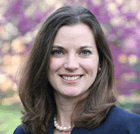The U.S. Supreme Court resuscitated the ailing concept of freedom of religious expression with its decision last week in Town of Greece v. Galloway. In doing so, it exposed serious flaws in a 2011 Fourth Circuit ruling and Governor McAuliffe’s rationale for vetoing two religious liberty bills last month.
In the landmark ruling on the issue of public invocations, the Supreme Court reversed the Second Circuit Court of Appeals’ decision that the Town of Greece, New York, had created an unconstitutional “establishment” of religion by allowing local clergy members to offer invocations at Town meetings on a voluntary, non-discriminatory basis.
The Second Circuit had ruled that despite the policy’s neutrality, it violated the Establishment Clause because, in fact, most of the clergy members who volunteered to pray represented the Christian faith. This was unacceptable, held the federal court, because non-Christians in attendance at the meetings may have felt left out.
The Supreme Court emphatically rejected this reasoning, finally laying to rest a dubious distinction that has appeared in countless lower court decisions on cases dealing with public prayer: the distinction between generic religious speech (acceptable) and speech that refers specifically to Jesus Christ (in the views of many courts until now, unacceptable).
In the words of Justice Kennedy, who authored the opinion, “To hold that invocations must be nonsectarian would force the legislatures that sponsor prayers and the courts . . . to act as supervisors and censors of religious speech…” Such supervision and censorship, of course, is directly at odds with the Free Speech, Free Exercise, and Establishment Clauses of the First Amendment.
Unfortunately, the lower federal courts have often failed to recognize this.
In a situation remarkably similar to the one that prompted this Supreme Court case, two North Carolina plaintiffs sued a County Board of Commissioners over its policy of allowing citizens to offer uncensored prayers before meetings—a practice which “made [the plaintiffs] feel distinctly unwelcome” due to frequent Christian references.
The Fourth Circuit sided with the offended listeners and struck down the invocation policy in a 2011 decision titled Joyner v. Forsyth County. The court specifically held that a prayer before a government meeting would be permissible “only when it is nonsectarian in both policy and practice.”
The Supreme Court’s decision squarely contradicts that Fourth Circuit ruling and its underpinnings.
It also contradicts the expressed rationale for Governor McAuliffe’s recent veto of two bills designed to protect citizens’ religious liberty: one that would have prohibited government restrictions on the content of sermons offered by Virginia National Guard chaplains, and another that would have allowed student speakers at public events to express religious views to the same extent as they would be allowed to express secular views.
For many, these bills seem to protect rights so obvious and fundamental that they should not even require special legislation. When did the government of a nation born of yearnings for religious freedom put itself in the business of secularizing society?
McAuliffe claimed that both bills were objectionable because they might expose listeners to prayers or religious viewpoints they didn’t want to hear. He considered a student’s voluntary prayer at a public event to have a “coercive” effect on others in attendance, and proclaimed that students have a right to be free from “religious messaging.”
But speech—even religious speech—is inherently non-coercive. That is precisely why society can afford to declare “free speech” to be every person’s right. The right of free speech cannot coexist with the “right” described by the Governor to be free from hearing “messaging” one does not like. And this is what the Supreme Court has recognized.
The Court emphatically distinguished between experiencing a sense of affront upon hearing the expression of religious views contrary to one’s own (acceptable as a cost of living in a free society), and actually being coerced to support a religion in some way (unacceptable as a violation of religious liberty).
Freedom-loving Virginians should applaud the Supreme Court’s decision because it effectuates the real purpose of the First Amendment, which is to protect citizens’ rights to free expression and religious exercise—not to put government in the business of censoring prayers to ensure that non-believers never feel “left out.”
The Fourth Circuit Court of Appeals will be bound to follow the High Court’s ruling in future cases on this issue. But it will be up to us, as a self-governing people, to elect only legislators and executives who understand what freedom means and are prepared to protect it.
Originally published in the Richmond Times-Dispatch
 Rita M. Dunaway is vice president for Public Policy with Virginia Christian Alliance. She lives in Harrisonburg.
Rita M. Dunaway is vice president for Public Policy with Virginia Christian Alliance. She lives in Harrisonburg.
